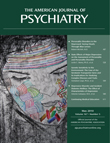To the Editor: I read with interest the study by Anne-Katharina Fladung, Ph.D., et al. (
1), published in the February 2010 issue of the
Journal, and wish to seek further interpretation of some of the outcomes.
Patients with acute anorexia nervosa had an increase in ventral striatal activation in response to underweight female body images (versus normal weight) and showed preference for underweight images, whereas in healthy comparison subjects, ventral striatal activation was shown in response to normal weight female body images where these participants preferred normal relative to underweight images. Within groups, the difference (magnitude) between stimuli sets was significantly smaller in healthy women, interpreted as a "qualitative difference." To elaborate on this finding, perhaps women with anorexia nervosa are selectively biased toward processing normal weight images aversively and underweight images as rewarding, whereas healthy women may perceive underweight images aversively but normal weight images as at least preferable (within context). How can a similar pattern of striatal activation occur in both groups? Perhaps knowing participants' experience of aversion toward normal versus underweight body images might inform the interpretation regarding the difference in magnitude.
When asked to judge the weight of the female body image, there were no between-group differences suggesting that perception of weight was independent of body mass index (or other anorexia nervosa factors). Examining which brain regions enable women with anorexia nervosa to appropriately perceive the weight of a female body image relative to which regions are involved when they are asked to imagine themselves to have the same body type depicted in the image (e.g., self-referent questioning in the feel task) might reveal important regions involved in dysmorphic self-assessments.
A strength of the overall task is that it inherently taps disorder-specific constructs. Statistical analyses were "constrained to the bilateral ventral striatum," which was the region of interest. It may seem logically inconsistent that complex cognitive processing of visual stimuli in conjunction with highly thought-provoking self-referent questions would occur (or be postulated) within this single region of interest.
Data (voxel clusters) were not available outside the region of interest. However, an absence of activity in cognitive cortices (at reduced significance thresholds) may warrant speculation. Is this abnormal? Does ventral striatal activation overcompensate for more executive regions? Absent activity is compared with a study (
2) conversely showing frontal and parietal activation upon processing of wins and losses in a gambling task. Dr. Fladung et al. (
1) highlighted that task differences in uncertainty and reward-linked value may account for disparate results between studies, but perhaps overlooked patients were already recovered (
2).
Relative to the previous study (
2), Dr. Fladung et al. stated that the absence of differential ventral striatal activation toward disease nonrelated rewards but the presence of differential activation toward disease-related stimuli (in the current study) is consistent with theories of starvation dependence in patients. Given that the current study investigated patients experiencing acute anorexia nervosa whereas the previous study investigated recovered individuals (
2)—without knowing whether brain activation in response to starvation-dependent-linked stimuli dissipates or persists—the conclusion remains speculative.

